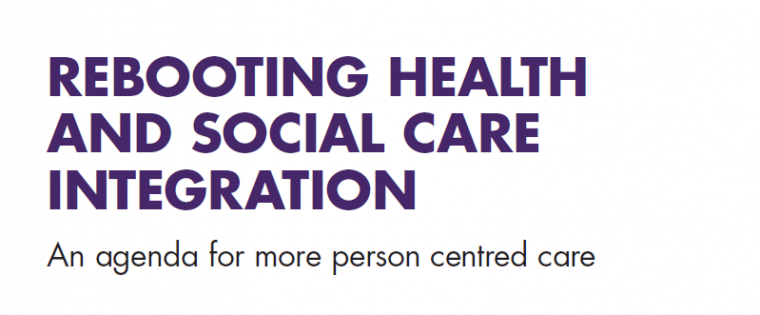Rebooting health and social care integration
An agenda for more person centred care
Author: Liam Booth-Smith |

Rebooting Health and Social Care Integration
An agenda for more person centred care
To some health and social care integration offers the ‘holy grail’ of financial sustainability. To others it is a way of moving the locus of care away from the acute sector and towards the community. A minority even suggest it is an attempt by one service to take over the other. Amongst the many rationales there is a common thread however: the individual receiving care or treatment. Whether you think integration is about money, structures or sovereignty, the view that more integrated health and social care creates better experiences for the people using those services, is near universal. At a time when local partners are finally agreeing that we are integrating in order to create a system which gives the patient or service user more control over their own care, the agenda itself is under threat.
- Independent reviews have cited concerns over the lack of financial and social outcomes generated by the integration agenda.
- Recent policy shifts by NHS England signal a move away from health and social care integration towards greater internal integration within the NHS, with social care’s role being explicitly non-compulsory.
- Concerns over devolution have called into question how likely it is local areas will receive powers similar to that of the Greater Manchester Combined Authority, whose leaders control a pooled health and social care budget.
- Political uncertainty over how to address the funding of social care only increased during the recent general election.
It is clear from our research that the health and social care integration agenda has a future but it is dependent on moving away from notions of structural integration and reliance on central policy direction. The issue of funding and financial sustainability is critical but can only be influenced locally, not decided. To that end the funding question must be addressed centrally and health and social care integration should not be a hostage to the delays in doing so. Health and social care integration can create new value locally, but it must build on its most important point of consensus; greater person centred care.
Strategic recommendations to support integration:
Recommendation 1: In the forthcoming social care green paper government should make the question of a sustainable funding solution central. The 2014 Care Act provides a cap mechanism to protect individuals from extremely high care costs, and government should recommit to its implementation given the political resistance to altering it. However, this means there will need to be increased state spending in order to support the system. Government should explore the widest range of options possible from hypothecated new taxes (both local and national) through to reform of age related benefits, such as the Winter Fuel Allowance.
Recommendation 2: Government should support better collaboration around finance and commissioning locally by simplifying departmental responsibilities. As has been recommended by others Government should transfer social care funding responsibility from the Department for Communities and Local Government to the Department for Health, where responsibility for policy currently sits. Local authorities would still retain budgetary control locally, but the alignment of funding and policy centrally would help local leaders build better relationships with the Department of Health.
Recommendation 3: To support the long term joining up of social, primary and community services in order to create person centred local services, government should look beyond the NHS England Five Year Forward View and, as had been recommended by the House of Lords Select Committee on the Long Term Sustainability of the NHS, set out a medium term strategy up to 2025. This plan should be devised in consultation with key stakeholders and should be focused on establishing the necessary actions to support the creation of more person centred care.
Recommendation 4: Government should establish a long term health and care workforce review. This should consist of NHS England, the LGA, ADASS, Royal Colleges, General Medical Council, the Nursing and Midwifery Council and other relevant partners. The purpose would be to provide a strategic assessment of the long term workforce challenges and opportunities. It should also establish a common framework by which all local areas could begin to establish local joint workforce strategies.
Policy recommendations to support integration:
Recommendation 5: Whilst there is no likely systematic obstruction to local government’s capital classification powers, our analysis suggests local authorities should be encouraged to use the capitalisation mechanism much more to invest in digital technology to support an increase in better care options for patients. To that end government should issue clarifying guidance on what is permissible for capitalisation, expanding and clarifying the remit of what its own guidance terms “a digital approach” to service delivery to include the wider transformation, training and support programmes needed to ensure that technology is effectively used and its potential maximised.
Recommendation 6: Government should look to encourage greater investment in businesses that create products which support assisted living (and could potentially be export businesses in a growing global market). As previously highlighted in a Localis report on the Industrial Strategy government could offer tax reliefs as part of the Enterprise Investment Scheme (EIS) and its subsidiary Seed Enterprise Investment Scheme (SEIS). Relief on investment for both could be enhanced respectively. Currently the EIS provides investors with 30% tax relief on investments of up to £1m a tax year in shares of smaller, high-risk companies. The SEIS provides 50% tax relief on investments up to £100,000 and encourages seed investment in early-stage companies. With growing global demand for assistive technology and products these businesses should be attractive to investors already, but with this change to investment relief the profile of the opportunity would be raised.
Recommendation 7: Subject to a positive evaluation of the pilot programmes, government should legislate to make Personal Health Budgets mandatory for the most promising specific care pathways. Personal Health Budgets should become the new default delivery mechanism for these care pathways. NHS England and the Local Government Association have collaborated on the Integrated Personal Commissioning (IPC) programme which could become the mainstream integrative model of support for the care pathways chosen.
Recommendation 8: Government should commission an independent review to explore the existing and potential future range of financial support incentives to encourage family members to consider providing support to a relative who needs care. These could include;
8.1: Should Government introduce a worker’s right to access 52 weeks leave to provide care to a relative, government should explore the feasibility of making contributions to an employee’s pension scheme over any period their leave is designated as ‘unpaid’ to ensure that taking a sustained period of time off work to care for a relative does not unduly hamper a person’s own planning for older age.
8.2: Opening up the criteria for access to Carers Allowance, including reducing the minimum number of hours required providing care down from 35 and increasing the amount an individual can earn above £116 to £144 to reflect future increases in the national living wage.
Recommendation 9: Government should ensure that data sharing between the NHS, social care and the relevant community partners, is set out as a strategic objective as part of the next published NHS Mandate (2018/19).
Recommendation 10: Government should act on the recommendations of the recent Naylor Review to achieve greater value and efficiency out of the NHS estate. However, it should also insist on greater collaboration from the NHS with other partners via the Cabinet Office and LGA backed One Public Estate’s programme.
Advisory panel:
Rob Whiteman, Chief Executive, CIPFA
Sarah Pickup, Deputy Chief Executive, LGA
David Hare, Chief Executive, NHS Partner’s Network
Paul Briddock, Director of Policy and Strategy, HFMA
Peter Fahy, Director of Adult’s Services, Coventry City Council
Peter Hay, Former Director of People, Birmingham City Council
Iain MacBeath, Director of Health and Adult’s, Hertfordshire Council
Madeleine Starr, Director Business Development, Carers UK
Barbara Peacock, Director of People, London Borough of Croydon
Dr Dan Poulter MP, former Health Minister

